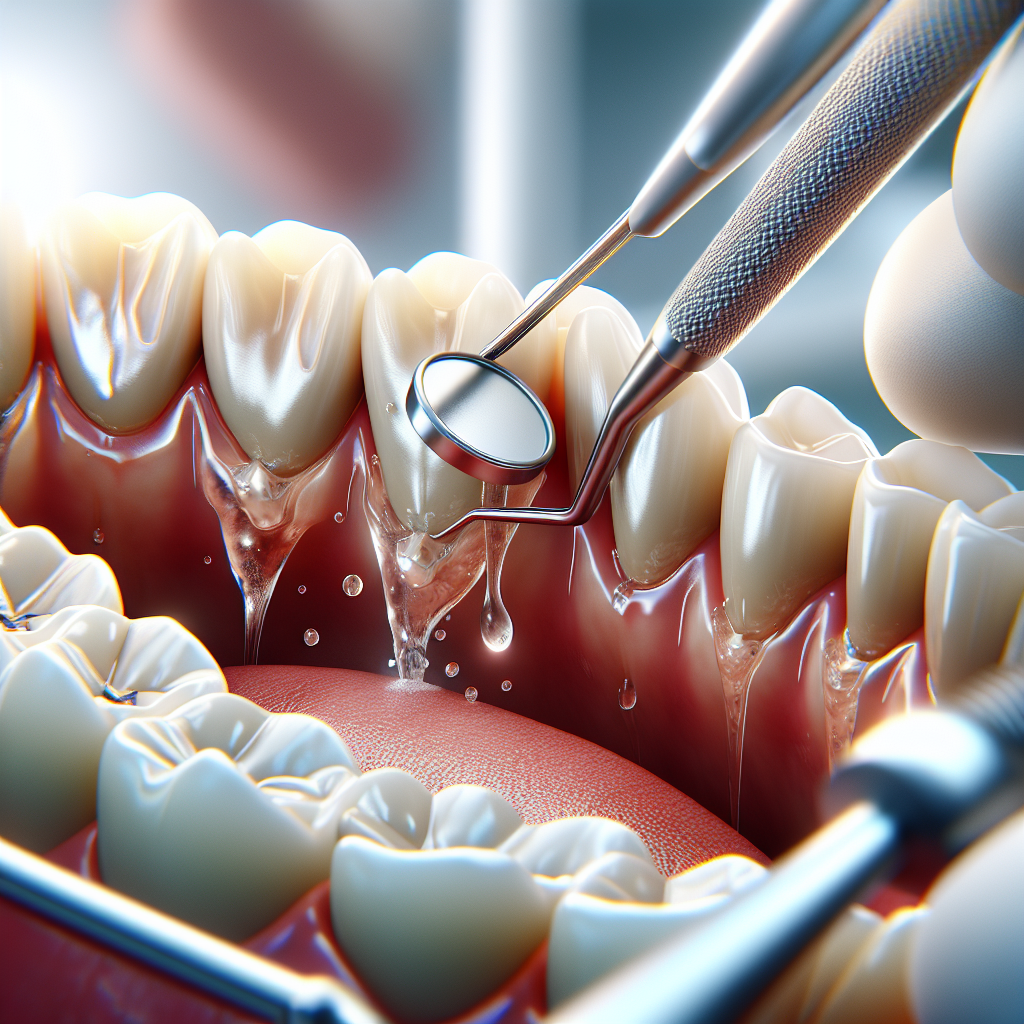
Dental hygiene is crucial not only for maintaining a bright smile but also for ensuring overall health. One important procedure in maintaining oral health is deep cleaning, also known as scaling and root planing. This procedure goes beyond regular teeth cleaning to target plaque and tartar build-up below the gumline, which can lead to gum disease if left untreated.
Deep cleaning involves two main parts: scaling and root planing. *Scaling* is the process of removing plaque and tartar from the surface of the teeth and from the pocket area between the teeth and gums. *Root planing* involves smoothing out the roots of the teeth to help the gums reattach to the teeth and prevent bacteria from lodging in these pockets.
This procedure is typically recommended for individuals showing signs of gum disease, such as gum inflammation, bleeding, and deep periodontal pockets. It is a crucial step in preventing the progression of gum disease to more severe stages, which could eventually lead to tooth loss.
Understanding whether your dental insurance covers deep cleaning can help you make informed decisions about your oral health care. If you’re unsure about what your plan covers, reaching out to your insurance provider for detailed information is a good starting point.
At Tidyups Cleaning Service Inc, we believe in maintaining clean environments, whether it’s your home or your health. Visit our website to learn more and get your FREE Quote today! Click here.
Delta Dental Insurance Coverage Overview

Delta Dental is one of the largest and most popular dental insurance providers in the United States, offering a variety of plans to suit different needs and budgets. Understanding what your insurance covers is essential for maximizing your benefits and ensuring comprehensive dental care.
Delta Dental typically provides coverage for a wide range of dental procedures, including preventive care, basic procedures, and major procedures. Preventive care often includes regular check-ups, cleanings, and X-rays, which are crucial for maintaining oral health. These services are usually covered at a higher percentage, often up to 100%, depending on your specific plan.
For basic procedures like fillings, extractions, and periodontal treatments, Delta Dental plans generally cover a significant portion of the costs, though the percentage may vary. Major procedures, such as crowns, bridges, and dentures, are usually covered at a lower percentage, reflecting their higher costs and complexity.
It’s important to note that each Delta Dental plan has its own specific coverage details, including deductibles, co-pays, and maximum annual benefits. Members should review their plan documents or consult directly with Delta Dental to understand the specifics of their coverage.
Being aware of what is included in your dental insurance plan can help you make informed decisions about your dental care. This knowledge empowers you to seek necessary treatments like deep cleaning without the worry of unexpected expenses.
Eligibility for Deep Cleaning Coverage

Determining whether your deep cleaning procedure is covered by Delta Dental insurance involves understanding the eligibility criteria that the insurer requires. Deep cleaning, also known as scaling and root planing, is a specialized periodontal treatment aimed at treating gum disease by removing plaque and tartar from below the gum line.
Eligibility for deep cleaning coverage under Delta Dental typically depends on the diagnosis provided by your dentist or periodontist. Generally, the procedure is covered if it’s deemed medically necessary due to the presence of periodontal disease. This is often determined through a comprehensive dental examination that includes X-rays and a periodontal evaluation to assess the health of your gums.
Most Delta Dental plans require that a certain level of gum disease be present before approving coverage for deep cleaning. This could include indicators such as deep periodontal pockets, bone loss, or excessive plaque buildup that regular cleaning cannot address. Additionally, some plans might require a pre-treatment estimate or prior approval before the procedure is performed to confirm the coverage.
Patients should also be aware of any waiting periods or frequency limitations that might apply to periodontal treatments. Waiting periods are common in dental insurance plans and can delay coverage for certain procedures until a specified time has elapsed.
To ensure that you meet the eligibility requirements for deep cleaning coverage, it is advisable to consult with your dental care provider and Delta Dental’s customer service. This will help you navigate the terms of your policy effectively and avoid unexpected out-of-pocket expenses.
How to Maximize Your Dental Benefits

Understanding how to effectively utilize your dental insurance can significantly reduce out-of-pocket expenses and ensure you get the most out of your coverage. To maximize your dental benefits, start by thoroughly reviewing your policy details, including the services covered, annual maximums, and any applicable deductibles or co-payments.
First, take advantage of preventive care services. Most Delta Dental plans cover routine cleanings and exams at little to no cost. By regularly attending these appointments, you can prevent more serious dental issues that require costly treatments. Staying proactive with your dental care can help maintain oral health and keep your insurance costs low.
Next, schedule your dental treatments strategically. If you anticipate needing extensive dental work, consider planning it across two benefit years to avoid exceeding your annual maximum. By splitting the treatments, you can utilize the maximum coverage available each year.
Additionally, familiarize yourself with in-network and out-of-network providers. Choosing a dentist within Delta Dental’s network can greatly reduce your expenses, as these providers have agreed to accept negotiated rates, which are often lower than standard fees. This ensures you are only responsible for the portion of the cost determined by your insurance policy.
Don’t forget to use any flexible spending accounts (FSAs) or health savings accounts (HSAs) if available. These accounts allow you to set aside pre-tax dollars for medical expenses, including dental care, providing another avenue to save on costs.
Lastly, maintain clear communication with both your dental provider and Delta Dental. Understanding your coverage and any potential changes can help you make informed decisions about your dental care. By being proactive and informed, you can maximize your dental benefits and maintain excellent oral health.
Steps to Verify Your Dental Insurance Coverage

Ensuring that you understand what your dental insurance covers can prevent unexpected expenses and help you make the most of your benefits. Here are the essential steps to verify your dental insurance coverage:
1. Review Your Policy Documents: Begin by examining your insurance policy documents or the summary of benefits provided by your insurer. Pay special attention to the sections detailing covered services, exclusions, and any specific terms related to deep cleaning procedures.
2. Contact Delta Dental Directly: For the most accurate and personalized information, reach out to Delta Dental’s customer service. Have your policy number handy and prepare a list of questions regarding coverage specifics, such as whether deep cleanings are included, any applicable waiting periods, and the extent of coverage.
3. Consult Your Dental Provider: Your dentist’s office can be a valuable resource in understanding your coverage. They often have experience dealing with various insurance providers and can help verify what aspects of your treatment plan will be covered by your insurance.
4. Check Network Participation: Verify if your dental provider is within Delta Dental’s preferred network. In-network providers usually offer services at reduced rates, which can significantly lower your out-of-pocket costs.
5. Understand Pre-Authorization Requirements: Some insurance plans may require pre-authorization for certain procedures, including deep cleanings. Ensure you understand these requirements to avoid any potential coverage issues.
6. Keep Records: Maintain detailed records of all communications with your insurer and dentist, including dates, names, and the information provided. This documentation can be vital if there are discrepancies or disputes about your coverage in the future.
By following these steps, you can confidently navigate your dental insurance coverage and ensure that you receive the benefits you are entitled to, particularly for necessary procedures like deep cleaning.
Alternative Options for Uncovered Treatments

Discovering that a crucial dental procedure, such as a deep cleaning, isn’t covered by your insurance can be disheartening. However, several alternative options can help you manage these costs effectively:
1. Dental Discount Plans: Unlike insurance, dental discount plans offer reduced fees on procedures in exchange for an annual membership fee. These plans can significantly diminish the cost of uncovered treatments, making them a valuable option for budget-conscious patients.
2. Payment Plans: Many dental practices offer payment plans that allow you to spread the cost of treatment over several months. This can ease the financial burden, turning a large upfront cost into manageable monthly payments.
3. Flexible Spending Accounts (FSAs): If you have access to an FSA through your employer, you can use these pre-tax dollars to pay for dental expenses, reducing your overall treatment costs.
4. Health Savings Accounts (HSAs): Similar to FSAs, HSAs allow you to save money tax-free for medical expenses, including dental treatments. Check with your HR department or financial adviser to see if this is an option for you.
5. Community Health Clinics: Some community health clinics offer reduced-cost dental services based on income. While availability may vary, these clinics can be a lifeline for those seeking affordable dental care.
By exploring these alternatives, you can find a solution that fits your financial situation while ensuring you receive the necessary dental care.
Visit our website to learn more and get your FREE Quote today! Click here.


